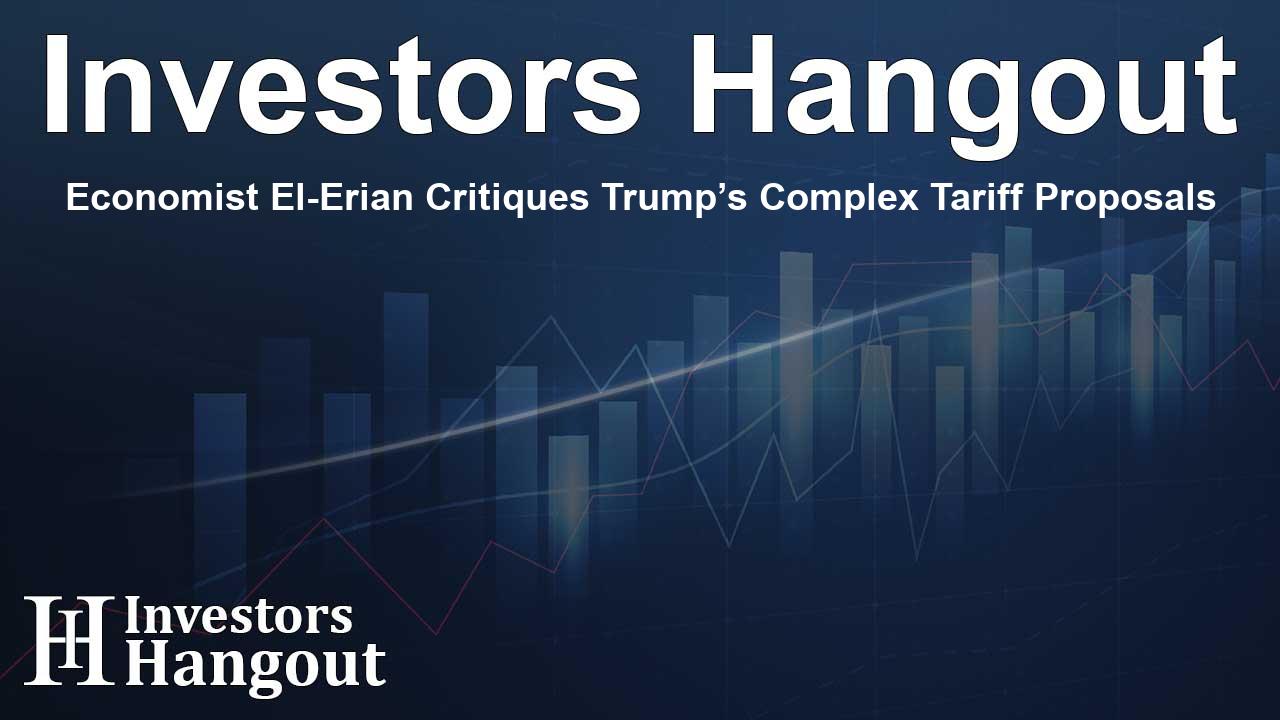Economist El-Erian Critiques Trump’s Complex Tariff Proposals

El-Erian's Caution on Tariff Strategies
As the political landscape shifts with the impending return of Donald Trump to the White House, highly regarded economist Mohamed El-Erian is voicing his concerns about the media's tendency to oversimplify the implications of proposed tariff strategies.
Understanding the Complexities
In a recent statement on a social platform, El-Erian pointed out that Trump’s tariff discussions are far from straightforward. He stressed that the proposed economic strategies encompass a minimum of three intricate economic stages, which are influenced by a variety of factors including trade dynamics, corporate pricing mechanisms, and global political relations.
Nuanced Analysis Is Crucial
El-Erian’s core message is one of urgency: intelligent and nuanced discussions regarding tariff policies are crucial in navigating the upcoming debates. He remarked, “The issue is quite complex,” emphasizing that an in-depth economic understanding is necessary beyond surface-level interpretations.
The Proposed Tariff Strategy
Trump's economic framework has introduced bold measures, potentially implementing universal tariffs reaching 20% on imports and up to 60% specifically on Chinese goods. This pivot has ignited fervent discussions among economists and industry leaders alike.
Potential Economic Aftershocks
Notably, tech investor Peter Thiel has suggested that while these tariffs may adversely affect Chinese firms, the impact on U.S. consumers could be limited. However, differing perspectives exist that raise concerns about long-term economic ramifications.
Reactions from Economic Experts
Goldman Sachs economist David Mericle has echoed these concerns, forecasting that the proposed universal tariffs might drive inflation rates back to levels around 3%. This shift could disrupt the Federal Reserve's strategies, complicating their monetary policy efforts amidst an already turbulent economic landscape.
Consumer Spending Predictions
One striking estimate from the National Retail Federation indicates that the tariff proposals could slash annual consumer spending by a staggering $78 billion, signaling potential hardships for everyday consumers.
Business Leader Opinions
Concerns voiced by prominent business leaders add further weight to the ongoing debate. For instance, Citadel LLC's CEO Ken Griffin has characterized the tariff proposals as a “long, slippery slope,” suggesting these measures could erode the U.S.'s global competitive edge.
Impact on Retail Prices
Retail giants, including AutoZone and Columbia Sportswear, have indicated that price hikes may be unavoidable, ultimately passing new costs onto consumers. El-Erian's analysis reflects apprehensions regarding the broader impacts of tariffs on businesses and consumers alike.
Market Implications and Stock Performance
Goldman Sachs analysts have pointed out that tariffs could significantly hinder the performance of stocks with strong international revenue, due to risks associated with retaliatory tariffs and rising geopolitical tensions. Their analysis noted disparities between domestic and international sales-focused stocks, with the former seeing better short-term performance following electoral outcomes.
Identifying Key Companies
Within the Domestic Sales Basket, key players include CVS Health Corp. (NASDAQ: CVS), Wells Fargo & Co. (NYSE: WFC), T-Mobile US Inc. (NASDAQ: TMUS), and Verizon Communications Inc. (NYSE: VZ), among others. Each company’s performance may be affected by shifting tariff policies and their economic implications.
Global Market Considerations
Conversely, companies in the International Sales Basket, such as Meta Platforms Inc. (NASDAQ: META) and Qualcomm Inc. (NASDAQ: QCOM), find themselves navigating a more uncertain future as these tariffs are implemented. Their longer-term viability could hinge on unfolding trade relations and global market dynamics.
Conclusion
El-Erian’s insights shine a light on the nuanced economic discussions surrounding Trump’s tariff strategies, calling for a greater understanding of the complex factors at play. As the administration formulates its approach, it is vital for both businesses and consumers to remain informed about the potential impacts these policies may spawn on a domestic and global scale.
Frequently Asked Questions
What is Mohamed El-Erian's view on Trump's tariffs?
El-Erian urges sophisticated analysis, warning against oversimplification of complex tariff policies.
How might Trump's tariffs affect consumer spending?
Proposed tariffs could potentially decrease consumer spending by $78 billion annually according to estimates.
What are the economic stages of Trump's tariff strategy?
El-Erian notes at least three stages influenced by trade dynamics, pricing strategies, and geopolitical factors.
Which industries are most at risk from these tariffs?
Industries with high international revenue exposure face heightened risks due to possible retaliatory tariffs.
How can investors navigate the tariff environment?
Investors should focus on companies with domestic sales exposure, which have shown better resilience in volatile tariff environments.
About Investors Hangout
Investors Hangout is a leading online stock forum for financial discussion and learning, offering a wide range of free tools and resources. It draws in traders of all levels, who exchange market knowledge, investigate trading tactics, and keep an eye on industry developments in real time. Featuring financial articles, stock message boards, quotes, charts, company profiles, and live news updates. Through cooperative learning and a wealth of informational resources, it helps users from novices creating their first portfolios to experts honing their techniques. Join Investors Hangout today: https://investorshangout.com/
Disclaimer: The content of this article is solely for general informational purposes only; it does not represent legal, financial, or investment advice. Investors Hangout does not offer financial advice; the author is not a licensed financial advisor. Consult a qualified advisor before making any financial or investment decisions based on this article. The author's interpretation of publicly available data shapes the opinions presented here; as a result, they should not be taken as advice to purchase, sell, or hold any securities mentioned or any other investments. The author does not guarantee the accuracy, completeness, or timeliness of any material, providing it "as is." Information and market conditions may change; past performance is not indicative of future outcomes. If any of the material offered here is inaccurate, please contact us for corrections.